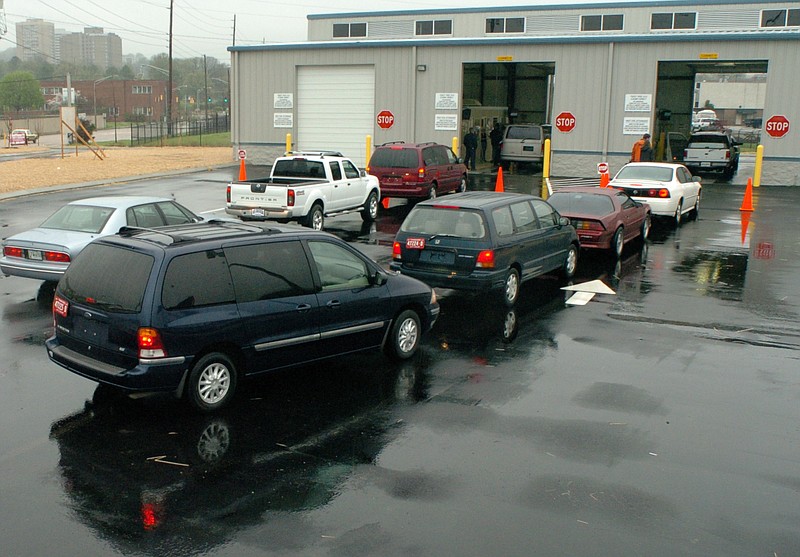The move to eliminate vehicle emissions testing in Tennessee was not something the late state Rep. Mike Carter did without much thought.
He ultimately would be taking on entrenched bureaucrats in the federal Environmental Protection Agency (EPA), individuals to whom "compromise" is a fighting word.
Carter also would be wrestling with other officials, agencies and organizations who would undoubtedly have trouble seeing a middle ground where it came to air pollution from automobiles.
But, as with so many other conundrums he encountered, he took a pragmatic approach to the issue: Who benefited and who got hurt the most?
On Tuesday, the Tennessee Department of Environment and Conservation (TDEC) announced that vehicle emissions testing in five Tennessee counties would end Jan. 14, 2022, since the EPA has approved a revision to the state's air quality plan.
This page revealed that likely scenario in April. But Carter, who had pancreatic cancer, had less than a month to live. That he won't see the triumph that he and state Sen. Bo Watson steered through the state legislature is sad.
"More fuel and energy efficient vehicles meant the program had largely outlived its usefulness," said state Rep. Joan Carter, who took her husband's place in the legislature, "yet the financial hardship on the very Tennesseans who could least afford it remained in place. Thanks to Sen. Watson, Leader Lamberth, TDEC, and all the great people across Tennessee who worked so hard to make this happen. Mike would be proud."
The Tennesseans who could least afford it were the very people around which Mike Carter framed his argument.
More efficient cars had solved much of the problem, but the emissions testing system came with its own Catch 22 set of circumstances. A vehicle owner could not renew his registration annually and get the attendant license plate sticker without getting his emissions tested. If the car's complicated emissions system had the least glitch, the car failed the emissions test, warranting expensive repairs so that it - drivers hoped - could pass the second time.
The problem was that many low-income Tennesseans couldn't afford the expensive repairs to their cars but needed their cars for work. So, instead of making the repairs (and thus not having the current registration sticker), they drove their cars "illegally." So, if they were stopped by the police, they not only faced the expense of tickets for an expired registration but - again - the expense of the repairs.
Carter heard the stories and sought to take action. That was in 2018, and the bill he and Watson crafted passed during that year's legislative session.
On Jan. 19 of this year, former EPA Region 4 administrator Mary Walker signed off on Tennessee's plan to end the program. It was to become official once it was published in the Federal Register. But out of an abundance of caution, Watson said in April, an additional 30-day public comments period was added to address a part of the plan.
Now, the approval will be effective on Sept. 16, 30 days after publication in the Federal Register, which occurred Tuesday. According to Tennessee law, the elimination of testing will be effective 120 days after EPA's approval, which means Jan. 14, 2022.
EPA, according to Tuesday's news release, determined the removal of vehicle emissions testing was consistent with the federal Clean Air Act and all applicable regulations. Its technical analysis concluded that after removal of vehicle emissions testing, Hamilton and the other affected counties would continue to comply with all National Ambient Air Quality Standards.
Contained in the January ruling was this definitive statement: "Hamilton County is currently in attainment with all [national air quality standards] for ozone levels." It stated further that, unlike the Middle Tennessee counties, Hamilton County was not required to operate a carbon monoxide monitor.
In the counties where vehicle emissions testing is ending, Hamilton, Rutherford, Sumner, Williamson and Wilson, owners registering their vehicles on or before Jan. 13, 2022, must still undergo the vehicle emissions test. Residents in those counties who register after Jan. 13 will not require testing. Davidson County opted to continue vehicle emissions testing.
Three years ago, Watson had this to say about the bill he and Carter introduced: "If you think about it, who is hurt most by having to pay for emissions? It's those who can least afford it. So in many ways I would argue we're removing a burden from some citizens who have less capability to pay to get their car fixed."
In Tuesday's news release, he said: "Emissions testing has been an unfair burden not only on Tennessee taxpayers, but particularly our poorest residents who are forced to remedy auto issues they can't afford. ... This long-awaited decision is a tremendous win for the people of Tennessee. My only regret is Rep. Mike Carter, who also worked relentlessly to end this now needless government program, did not live to see this day."
But after next Jan. 14, many Tennesseans will appreciate his pragmatism, if they don't already.
